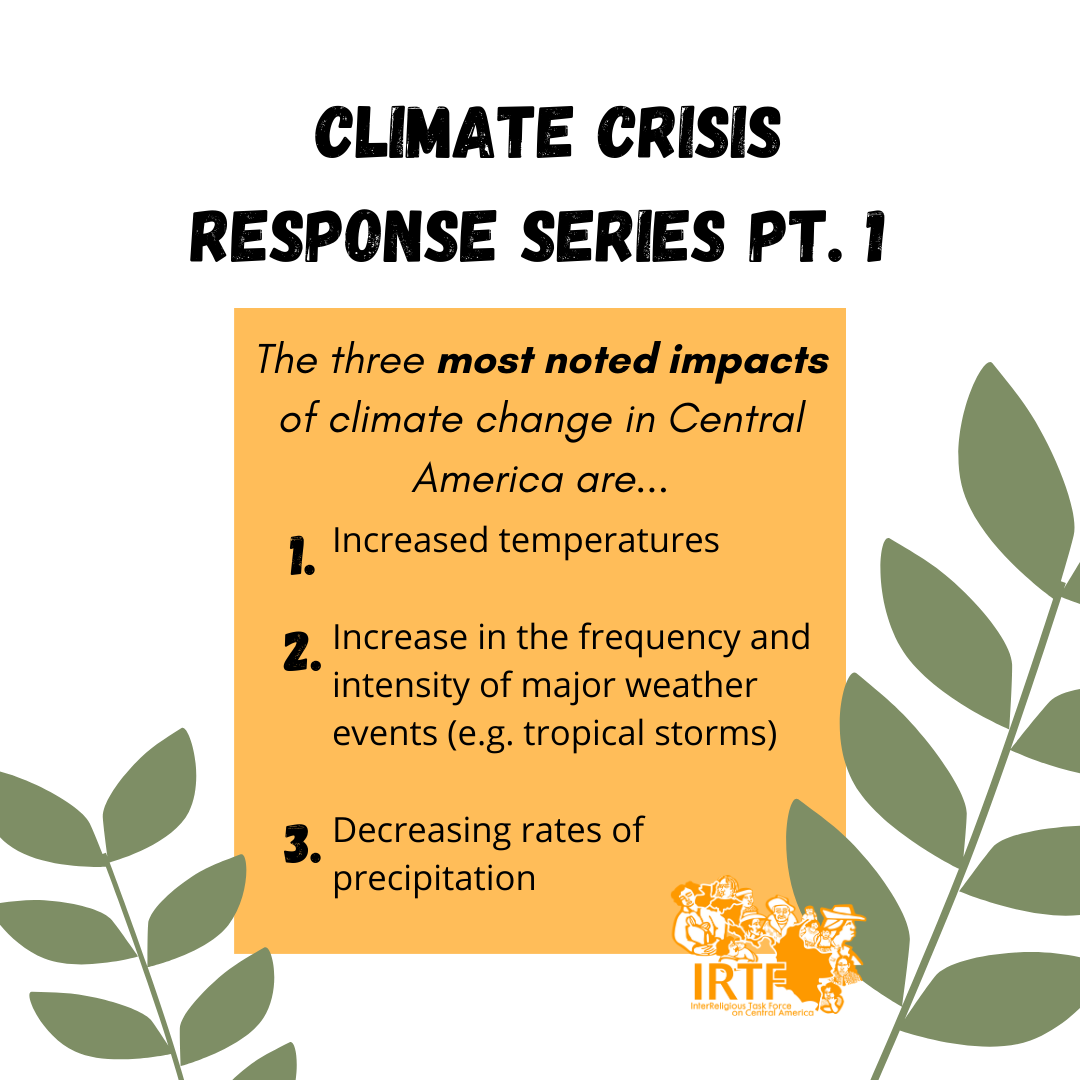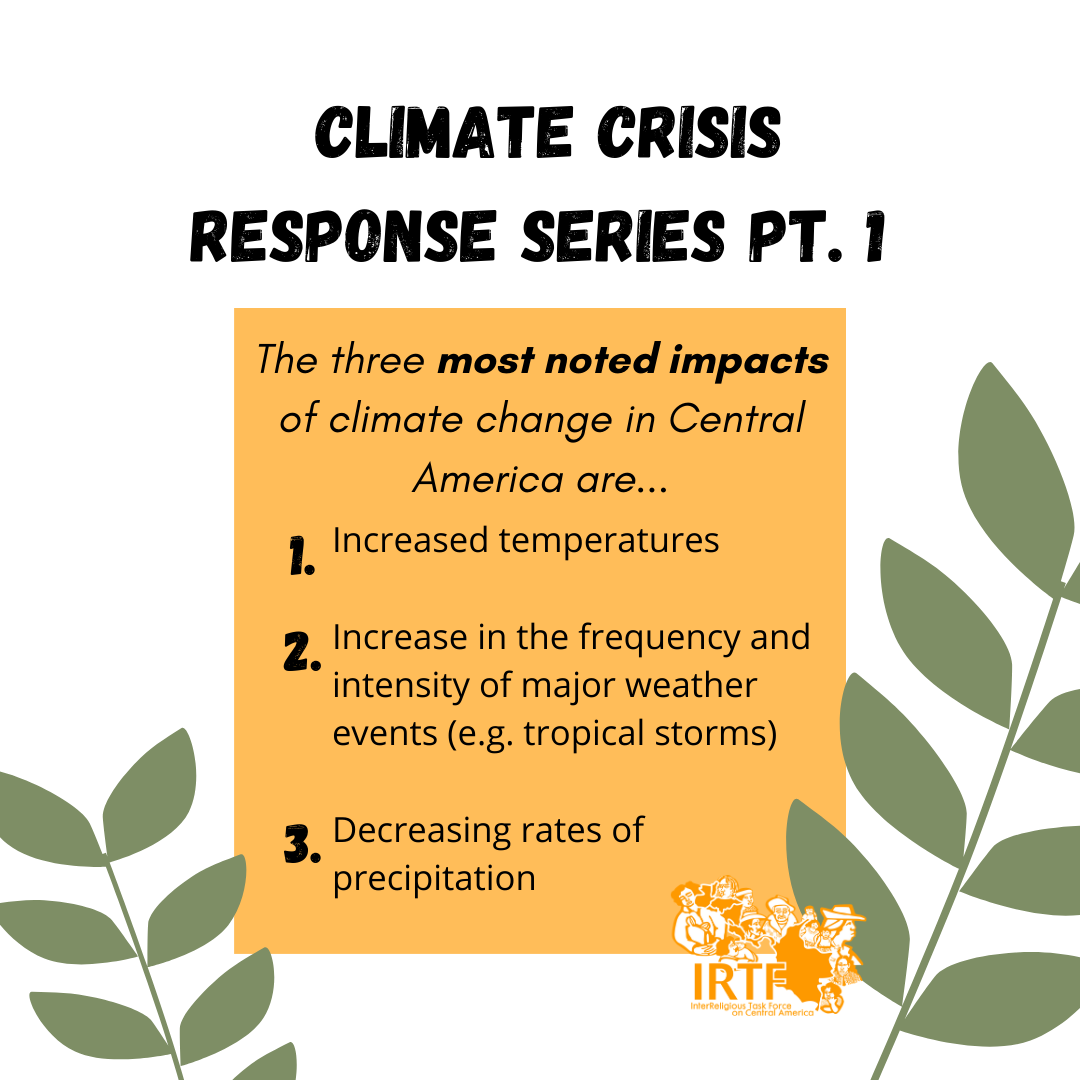- Home
- About Us
- Issues
- Countries
- Rapid Response Network
- Young Adults
- Get Involved
- Calendar
- Donate
- Blog
You are here
El Salvador: News & Updates
El Salvador is the smallest and most densely populated country in Central America. The US-backed civil war, which erupted after the assassination of Archbishop Oscar Romero in 1980, lasted 12 years (1980-92), killing 70,000 people and forcing 20% of the nation’s five million people to seek refuge in the US.
Learn more here.
News Article
September 2, 2020
We have already emitted enough greenhouse gases (GHGs), such as CO2, to change the very composition of our atmosphere. Scientists, researchers, policymakers, and governmental officials alike know this; they know that the effects of climate change are occurring now and will continue into the not-so-distant future. We now face the question: will we act now to limit the consequences of climate change by reducing emissions or continue with the status quo and suffer the consequences?
Content Page
September 1, 2020
In this series of infographics we explore the ways in which the climate crisis is impacting Central Americans and Colombians, how they are adapting, and how this crisis has created a surge of climate migration.
News Article
August 12, 2020
Although the effects of climate change reverberate around the globe, its effects vary from region to region, continent to continent, and Central America is no exception. // Aunque los efectos del cambio climático repercuten en todo el mundo, sus efectos varían de una región a otra y de un continente a otro, y Centroamérica no es una excepción.
News Article
June 18, 2020
Some 650,000 DREAMers are temporarily safe from deportation (at least for now) because of today’s Supreme Court ruling against the Trump administration. Chief Justice John Roberts cast the deciding vote when he joined the court's four liberal justices. Their ruling: the 2017 decision by DHS (Department of Homeland Security) to rescind DACA was arbitrary and capricious under the Administrative Procedure Act. This is an unexpected and positive ruling, but the fight on behalf of the DREAMers is far from over. DACA recipients have gotten advanced degrees; they have started businesses; they have bought houses, had children who are U.S. citizens; and 90% have jobs. Some 29,000 DREAMers are health care professionals. It’s no surprise that the majority of people in the US want the DREAMers to stay. But this won’t happen until Senator Mitch McConnell introduces the American Dream and Promise Act onto the Senate floor. The bill, which would give permanent legal status and path to citizenship for the DREAMers, was passed by the US House with an overwhelming majority on June 4, 2019. The Senate has stalled, refusing to take up this crucial piece of legislation.
News Article
April 27, 2020
Just days after the United Nations urged governments around the world to release vulnerable prisoners to ease overcrowding, President Bukele of El Salvador is doing the opposite. While Chile, Colombia and Nicaragua have announced they will move thousands of prisoners into house arrest, El Salvador is aiming to lock up more. El Salvador has one of the highest per capita murder rates in the world: 2.1 murders per day in March 2020. That average will go up in April since 24 people were killed on just one day, April 24. In response, the president has authorized the police and army to use lethal force to curb the violence. He is mixing members of rival gangs in prison cells and ordering 24/7 lockdown, saying that gangs are “taking advantage of the pandemic.” The security minister said that prisoners will: “not receive sunlight, they will be in total confinement 24 hours a day in [El Salvador’s] seven maximum security prisons.”
News Article
April 22, 2020
As Pope Francis wrote five years in Laudato Si’ (#139), the range of these issues, from deforestation to migration and overcrowded cities, suggests that “we are faced not with two separate crises, one environmental and the other social, but rather with one complex crisis, which is both social and environmental. Strategies for a solution demand an integrated approach to combating poverty, restoring dignity to the excluded, and at the same time protecting nature.”
News Article
April 22, 2020
"This country has been inhaling tear gas since 2009," said Bertha Oliva, coordinator of the Honduran human rights group the Committee of Relatives of the Disappeared in Honduras (COFADEH). Repressive measures to arbitrarily detain citizens and control their movements could become normalised in the long term, particularly if these abuses happen without resistance from citizens or civil society, according to Tiziano Breda, Central America analyst for NGO the International Crisis Group. "Where there's no check, the government will implement these kinds of initiatives even when the crisis has passed," Breda said.
Event
April 18, 2020
How can you wash your hands with no access to clean water? You can’t. After decades of right-wing attacks on essential public services, like health care and water, many people in El Salvador do not have the access they need to protect their health in this critical time, much less easily carry on daily cooking and cleaning tasks. Join our friends at CRLN for an online conversation with water defense activist and national labor union leader Marielos de Leon to learn how organizers in El Salvador are advancing the struggle for water rights for all–-and the important role that international solidarity can play today.
RRN Case Update
April 1, 2020
January, February, and March RRN case summaries at a glance
On behalf of our 190 Rapid Response Network members, IRTF volunteers write and send six letters each month to government officials in southern Mexico, Colombia, and Central America (with copies to officials in the US).
Who is being targeted? indigenous and Afro-descendant leaders, labor organizers, LGBTI rights defenders, women’s rights defenders, journalists, environmental defenders, and others.
By signing our names to these crucial letters, human rights crimes are brought to light, perpetrators are brought to justice and lives are spared. Our solidarity is more important than ever. Together, our voices do make a difference.
News Article
March 6, 2020
Several years ago, Camila Díaz left her native El Salvador and went to the United States, looking for a place where she would be safer as a transgender woman. But she failed to find a sympathetic ear. Deported back to San Salvador, the nation's capital, she was killed just over a year later. Díaz, 30, was one of 138 Salvadorans deported from the United States who have been killed upon returning to their country since 2013, according to a report by Human Rights Watch. Mónica Linares, an activist with the rights group Arcoiris Trans (Rainbow Trans) said the group had demanded authorities investigate her killing.



